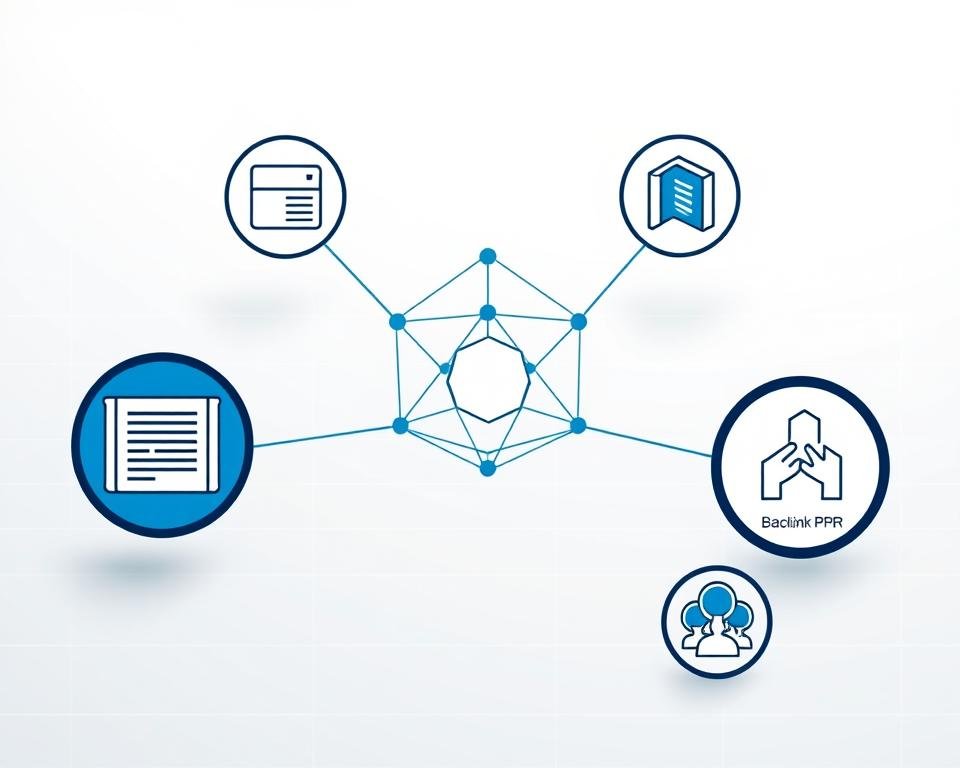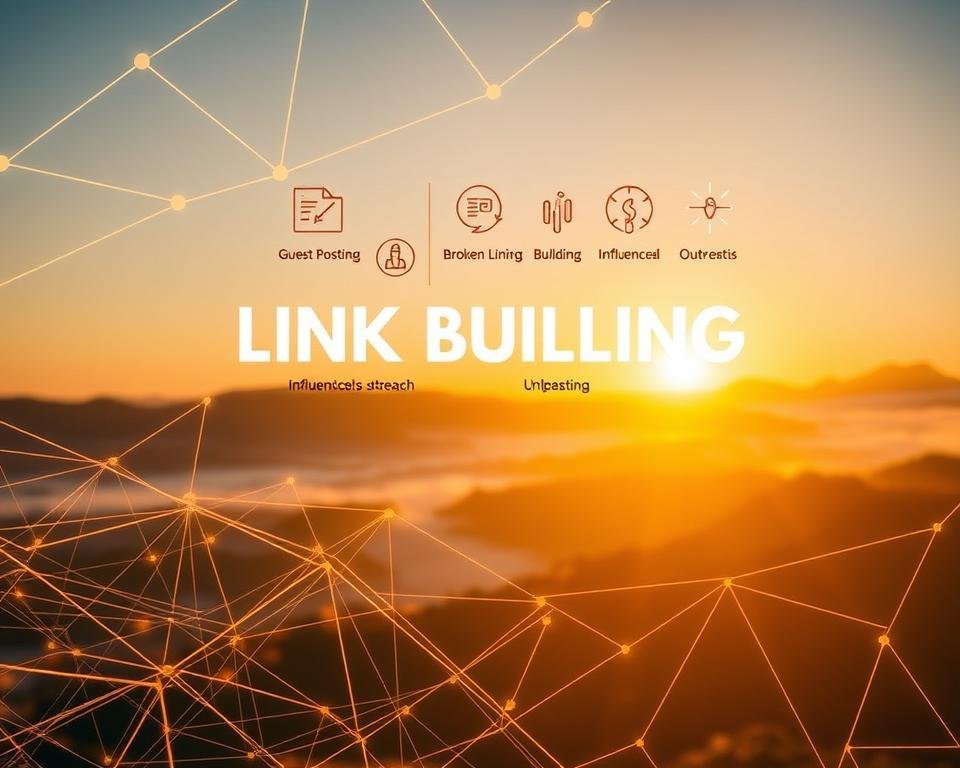Link building is a key part of search engine optimization (SEO). It means getting links from other websites to yours. This helps show search engines your site is trustworthy and important.
In digital marketing, link building is very important. It helps your website be seen more online. Getting good backlinks can make your site more visible, bring in more visitors, and boost your authority online.
Key Takeaways
- Link building is essential for SEO success.
- High-quality backlinks improve website credibility.
- A well-planned link building strategy enhances online presence.
- Link building drives more traffic to your website.
- It’s a key factor in determining search engine rankings.
Introduction to Link Building
Link building is key to SEO. It’s about getting good links to make your site more important. It’s not just about getting links. It’s about getting links that make your site better.
Good link building means getting links that fit your site and come from trusted places. This makes your site more believable and seen more in search results.
Definition of Link Building
Link building means getting links from other sites to yours. It’s a big part of SEO. Good links come from sites that are trusted and related to yours.
It’s better to have a few good links than many bad ones. Search engines like Google look at links to see if your site is good.
Importance in Digital Marketing
In digital marketing, link building is very important. It helps your site show up better in searches. It brings more people to your site and makes your brand look good.
Link building also helps your digital marketing plan. It works with other SEO things like making and improving content. This makes your site strong online.
| Aspect | Importance | Benefit |
|---|---|---|
| Search Engine Rankings | High | Improved visibility and credibility |
| Website Traffic | Medium | Increased targeted traffic |
| Brand Authority | High | Established as a trusted source |
The Role of Links in SEO
Links are key in SEO, helping search engines understand and rank websites. They connect content and help find new info.
Types of Links
There are many types of links important for SEO. These include:
- Internal links: These connect pages on a site, making it easier to navigate and understand.
- External links: These link to other sites, adding value and credibility to content.
- Backlinks: These are links from other sites to yours, showing your content’s worth.
Internal linking is key for website navigation and SEO. It helps search engines see your site’s structure and boosts visibility.
| Type of Link | Description | SEO Impact |
|---|---|---|
| Internal Links | Links within a website | Improves user experience and website structure |
| External Links | Links to other websites | Enhances credibility and provides additional information |
| Backlinks | Links from other websites | Increases website authority and ranking |
How Search Engines Use Links
Search engines like Google use links to crawl, index, and rank sites. Here’s how:
- Crawling: Search engines follow links to find new content.
- Indexing: They then index this content, making it searchable.
- Ranking: Indexed content is ranked based on relevance, authority, and link quality.

In conclusion, links are vital in SEO, affecting how search engines see and rank sites. Knowing about different links and their role in SEO is key for a good digital marketing plan.
Understanding Backlinks
Backlinks, or incoming links, are key for search engine rankings. They are links from one site to another. This shows search engines that the linked site’s content is valuable and relevant.
What Are Backlinks?
Backlinks are links to a webpage. They are important for SEO. They show a vote of confidence from one site to another. The quality and number of backlinks can change a site’s ranking.
Different Types of Backlinks
There are mainly two types of backlinks: dofollow and nofollow links.
- Dofollow Links: These links help the linked website’s credibility and ranking.
- Nofollow Links: These links don’t help with ranking. They’re used when the linker doesn’t support the linked site’s content.

Knowing about different backlinks is key for a good link building plan. Dofollow links are great for rankings. Nofollow links can also help with traffic and brand visibility.
| Type of Backlink | Description | SEO Value |
|---|---|---|
| Dofollow | Passes link equity | High |
| Nofollow | Does not pass link equity | Low |
In conclusion, backlinks are very important for SEO. They can greatly affect a website’s ranking and trustworthiness. By knowing about backlinks and their types, website owners can improve their online presence.
Why Link Building Matters
High-quality link building helps websites rank better in search engines. It also brings more visitors to your site. This is key for a strong online presence.
Improved Search Engine Rankings
Link building boosts a website’s search engine ranking. Search engines like Google look at links to see if a site is trustworthy. A site with good backlinks is more likely to rank high. Backlinks show search engines that the content is worth sharing.
Here’s how link building affects rankings:
| Link Building Strategy | Impact on Search Engine Rankings |
|---|---|
| High-quality backlinks | Improved rankings due to increased credibility |
| Low-quality backlinks | Potential penalties or decreased rankings |
| No backlinks | Limited visibility and lower rankings |
Increased Website Traffic
Link building also brings more visitors to your site. When a site gets links from popular sites, it attracts new visitors. This can lead to more engagement, conversions, and revenue.
To get the most from link building, aim for high-quality, relevant links. This boosts your online presence, drives more traffic, and improves rankings.
Key Benefits of Effective Link Building
By focusing on building quality links, businesses can show they are authoritative and trustworthy. This helps drive more sales and conversions.
Establishing Authority and Trust
When a website gets backlinks from good sources, search engines see it as reliable. This can make the website rank higher in search results. Search engines favor websites they trust.

Enhancing Brand Visibility
Good link building also makes a brand more visible online. As a website’s presence grows, so does its reputation. This makes users more likely to search for the brand directly.
- Increased online mentions
- Improved brand reputation
- Enhanced brand visibility
By using these benefits, businesses can build a strong online presence. This leads to long-term success.
Common Link Building Strategies
To boost your SEO, knowing link building strategies is key. Good link building makes your site more credible and ranks it higher in search engines. Here, we’ll look at top strategies like guest blogging, resource page building, and fixing broken links.
Guest Blogging
Guest blogging means writing for other sites in your field. It gets you backlinks and boosts your brand’s visibility. To do well, write engaging, valuable content for the host site’s readers.
Guest blogging’s main benefits are:
- More visibility for your brand
- More authority in your field
- Getting quality backlinks
Resource Page Link Building
Resource page building finds and uses pages that link to similar content. By suggesting your content, you get backlinks. Start by finding these pages with search terms like “resource page” or “useful links.”
Steps for resource page building:
- Find relevant resource pages
- Make or find great content on your site
- Ask the page owners to link to your content
Broken Link Building
Broken link building finds and fixes broken links on other sites. Use tools like Ahrefs or SEMrush to find them. Then, offer to replace them with a link to your similar content.

Benefits of broken link building:
| Benefit | Description |
|---|---|
| Relevance | Gets you relevant backlinks |
| Quality | Improves your backlink profile’s quality |
| Opportunity | Chance to replace broken links with yours |
The Do’s and Don’ts of Link Building
Link building is key to SEO. It needs a smart plan. Knowing the right ways and wrong ways is important.
Best Practices for Link Acquisition
To get good links, aim for high-quality ones from trusted sites. Here are some tips:
- Create valuable and relevant content that draws links naturally.
- Do guest blogging on well-known sites to reach more people.
- Use resource pages to link to other great sites and get links back.
- Try broken link building to swap dead links for live ones.
These practices will help your link building and boost your site’s authority.
Pitfalls to Avoid
Link building has its downsides. Here are common mistakes to steer clear of:
- Keyword stuffing in your anchor text can get you in trouble with search engines.
- Buying links or joining link schemes can hurt your site’s trustworthiness.
- Ignoring link quality and just focusing on quantity can hurt your SEO.
To show why link quality matters, look at this table:
| Link Characteristic | High-Quality Link | Low-Quality Link |
|---|---|---|
| Source Authority | High authority site (e.g., .edu, .gov) | Low authority site (e.g., spammy blog) |
| Relevance | Relevant to your content and niche | Irrelevant or unrelated to your content |
| Anchor Text | Diverse and natural anchor text | Overoptimized or repetitive anchor text |

Knowing the do’s and don’ts of link building helps you make a better SEO plan. It will improve your website’s online presence.
Measuring Link Building Success
To see if link building works, you need to look at many things. It’s key to track backlinks and check important performance signs.
Tools for Tracking Backlinks
There are many tools for tracking backlinks. Each one gives different info and insights. Some top tools are:
- Ahrefs
- Moz
- SEMrush
- Google Search Console
These tools help watch backlink profiles. They show new backlinks and check the quality of sites linking to you.

Key Performance Indicators (KPIs)
To know if link building is working, look at important KPIs. Some key ones are:
| KPI | Description |
|---|---|
| Domain Authority | A score that predicts a website’s ranking |
| Referral Traffic | The number of visitors from backlinks |
| Backlink Quality | The relevance and authority of linking sites |
By looking at these KPIs, you can understand your link building better. This helps you make better choices to get better results.
Challenges in Link Building
Link building is key but faces many hurdles. It’s a complex task needing deep SEO knowledge and quick adaptation to algorithm changes.
Common Obstacles
Several common obstacles can make link building tough. These include:
- Competition: The fight for top links is intense, making it hard to shine.
- Link Spam: Too much link spam can hurt your site’s trust with search engines.
- Algorithm Updates: Search engine updates often make old link strategies useless.
Knowing these hurdles is the first step to beating them.
How to Overcome These Challenges
To beat link building challenges, you need smart strategies. Here are some ways:
- Quality Over Quantity: Aim for a few high-quality links over many low-quality ones.
- Diversify Your Strategy: Try different link building methods to avoid relying on one.
- Stay Updated: Keep up with new SEO trends and updates to tweak your strategies.
Using these strategies can boost your link building and site visibility.

In summary, link building has its challenges. But, by understanding these and using smart strategies, you can succeed. Focus on quality, diversify, and stay current with SEO trends to win at link building.
Future Trends in Link Building
The world of link building is changing fast. New tech and SEO changes are leading the way. Knowing these trends is key for good SEO plans.
SEO changes are big for link building. Search engines now catch and punish bad link tactics. So, white-hat link building strategies are rising. They focus on making great content that gets links naturally.
Evolution of SEO Practices
SEO has grown a lot. It’s moved from old tricks like keyword stuffing to now valuing content and user experience. The future will see even smarter search engines. This makes ethical link building practices even more vital.
Some big changes in SEO include:
- More focus on content quality and relevance
- Deeper value on user experience and engagement
- Algorithms getting better at spotting and stopping spam
The Impact of AI and Machine Learning
AI and machine learning are changing link building. They help search engines understand content better and spot good links. As these techs grow, link building will get even more complex.
AI and machine learning’s role in link building includes:
- Better content analysis and understanding
- Spotting and valuing high-quality links
- Identifying and punishing spammy tactics
By grasping these link building trends, websites and SEO experts can keep up. They can get better rankings in search engines.
Conclusion: Making Link Building Work for You
Link building is key to a good SEO plan. It helps your website show up better online. By using smart link building, you can boost your site’s visibility and rankings.
Key Takeaways
We’ve learned that quality backlinks are very important. It’s also vital to avoid common mistakes and track your progress. With these tips, you can build a strong link building plan that works.
Implementing Your Link Building Strategy
Now you know a lot about link building. It’s time to start using what you’ve learned. Look for chances to guest blog, build links on resource pages, and find broken links to fix. This will help you build a solid SEO base and lead to lasting success.
